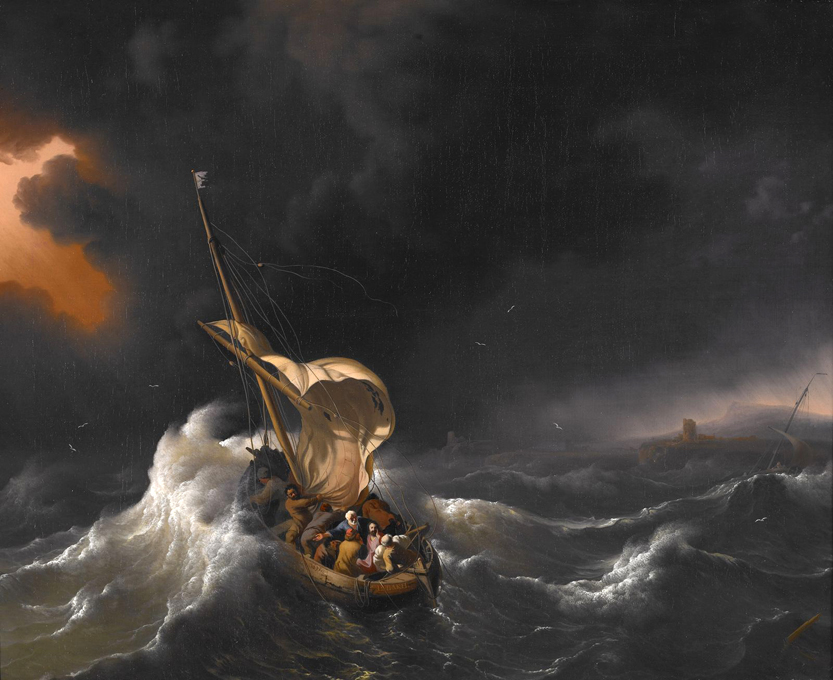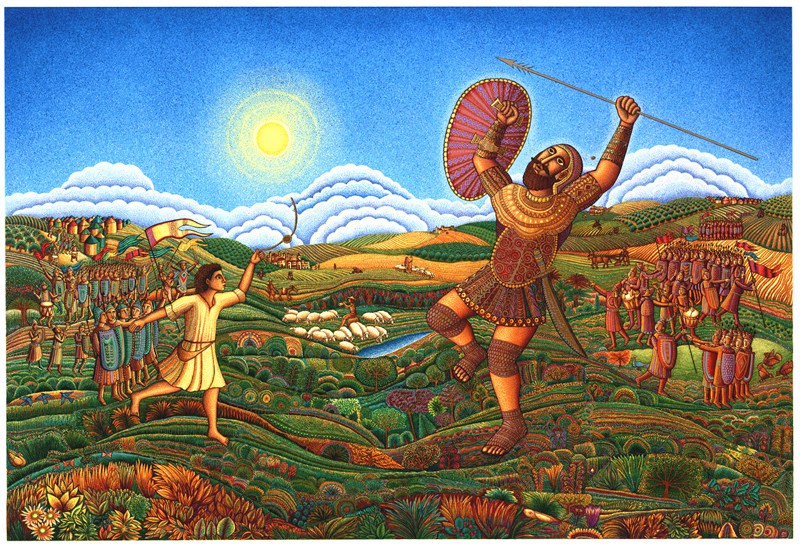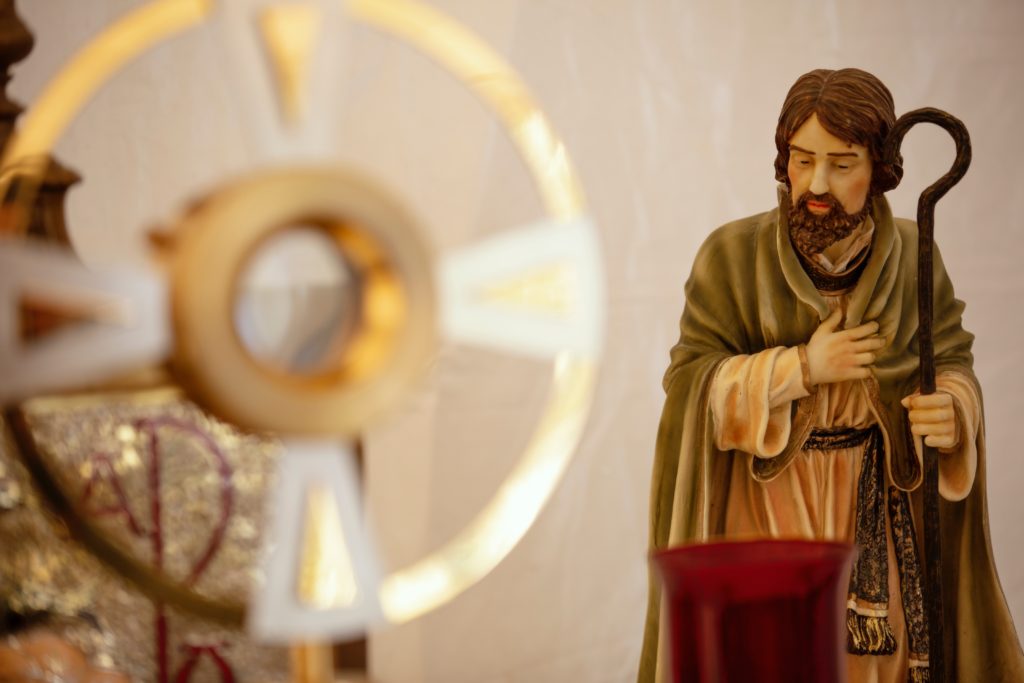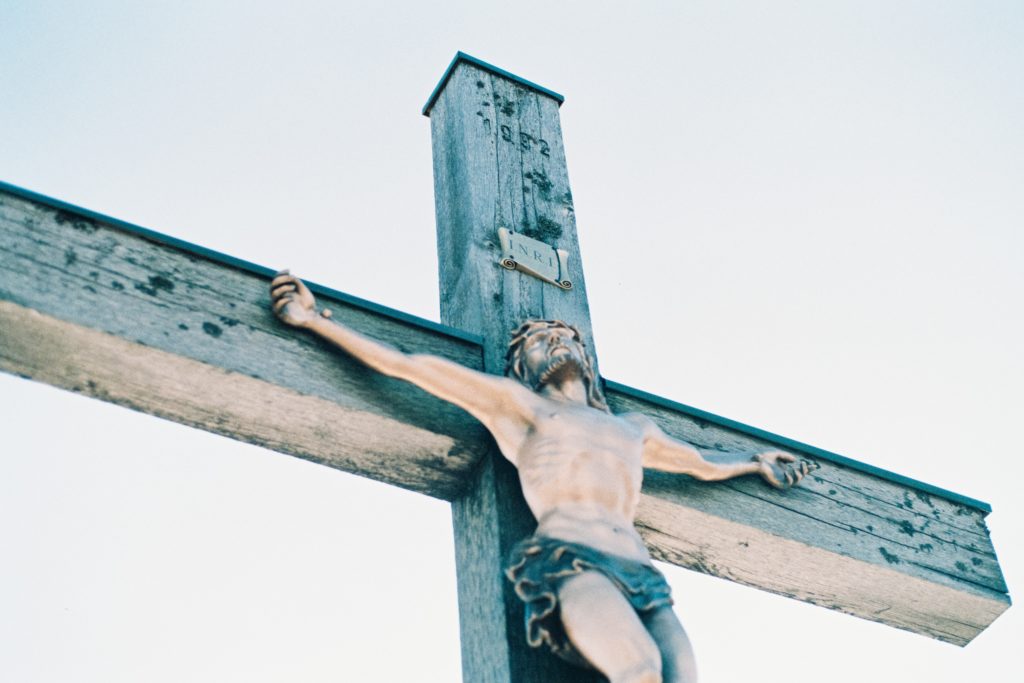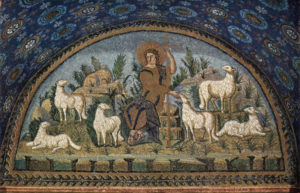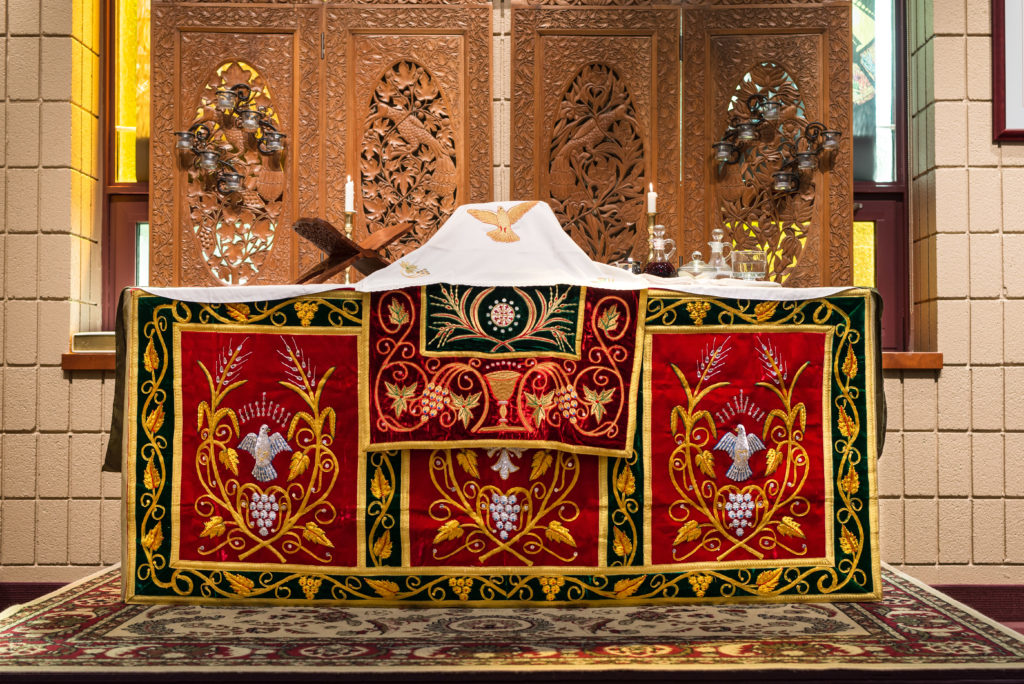
Proper 16b
St. John 6:56-69; 1 Kings 8:(1,6,10-11), 22-30, 41-43; Psalm 84; Ephesians 6:10-20
Mystery of the Eucharist
In today’s Gospel reading, we have what is described as a hard saying, and yet it is a saying that caused great excitement among our Church fathers. We become one with Christ, him living in us and us in Him by partaking of the Eucharist. One has compared this union, as melting two pieces of wax together so that it becomes one new piece of wax. In the same way, as we partake of His body and blood we are made one with Him. The mystery of what takes place has blown believers away across the centuries. By partaking of the Eucharist, we are somehow made one with the God of the universe and the creator of mankind. In the words of Cyril of Alexandria:
O sublime condescension! The Creator gives himself to his creatures for their delight. Life bestows itself on mortals as food and drink. “Come, eat my body,” he exhorts us, “and drink the wine that I have mingled for you. I have prepared myself as food. I have mingled myself for those who desire me. Of my own will I became flesh and have become a partaker of your flesh and blood…. Eat of me as I am life, and live, for this is what I desire…. Eat my bread, for I am the life-giving grain of the wheat, and I am the bread of life. Drink the wine I have mingled for you, for I am the draught of immortality….I am the true vine; drink my joy, the wine that I have mingled for you.1
Mystery of the Incarnation
He gives Himself for our food and drink, what wonder what mystery! Secondly, the mystery that He has become our flesh and blood. This second mystery, Cyril of Jerusalem saw intimated in the prayer of Solomon that we read this morning. “…Afterwards Solomon, hearing his father David say these things, and having built a wondrous house and foreseeing him who would come to it, says in astonishment, “Is it then to be thought that God should dwell on earth?” Yes, says David in anticipation in the Psalm inscribed, “For Solomon,” wherein it is said, “He shall be like rain coming down on the fleece”; “rain” because of his heavenly origin but “on the fleece” because of his humanity. For rain, falling on fleece, falls noiselessly; so that the mystery of his birth being unknown, the wise men said, “Where is he that is born king of the Jews?” And Herod, being troubled inquired concerning him who had been born and said, “Where is the Christ born?”2
God has become man. Is it any wonder that Solomon a thousand years before Christ, can only ask in anticipating wonder about what God would do? This question of Solomon’s “Is it then to be thought that God should dwell on earth?” Is seen to be answered even further according to St. Clement of Alexandria by the Church3. God did not only dwell among men in his body in the first century but he also dwells among men in the midst of His church today.
The Manna
Returning once again to eating the flesh and blood of Christ, we understand that to eat of Him is to eat of life. Nor is he killed to be eaten, he is alive and brings life to the dead. In this we realise another mystery, no matter how much we eat of Him, He never diminishes. We do not have to worry that if we eat today, that there won’t be any for a future day just like the manna was renewed each day in the wilderness. St. Augustin exhorts us, “Let Christ be eaten; when eaten he lives because when slain he rose again.”4
The manna, or the bread that came down from heaven, in the Old Testament, was supplied to the Israelites without harvest, nor fruit of the earth, nor any such thing and it preserved the lives of them for forty years. How much more will the true bread of heaven do for us, since he came for a greater purpose. The Old Testament could only offer long life, whereas our Saviour offers us life without end. This bread is a promise to abolish the sentence of death that sin has brought upon us.
Christ Our Daily Bread
In a discourse upon the Lord’s prayer, Cyprian of Carthage sees a twofold purpose of the petition give us this day our daily bread both a literal and spiritual application. His thoughts on the spiritual side I believe are beneficial to us this morning.
Christ is the bread of life; and this bread does not belong to all men, but is ours. And according as we say, “Our Father,” because He is the Father of those who understand and believe; so also we call it “our bread,” because Christ is the bread of those who are in union with His body…When therefore, He says, that whoever shall eat of His bread shall live forever; as it is manifest that those who partake of His body and receive the Eucharist by the right of communion are living, so, on the other hand, we must fear and pray lest any one who, being withheld from communion, is separate from Christ’s body should remain at a distance from salvation; As He Himself threatens, and says, “Unless ye eat the flesh of the Son of man, and drink his blood, ye shall have no life in you.” And therefore we ask that our bread–that is Christ–may be given to us daily, that we who abide and live in Christ may not depart from His sanctification and body.5
We see then, that we have a great opportunity to partake of the very flesh and blood of Christ in a few moments. It is through these sacraments that we have life and sanctification.
Harder Teachings
Ascension
Despite the greatness, or maybe because of the greatness of these mysteries many of his disciples complained of the hardness of the teaching and left him. A hard teaching, St. Chrysostom tell us, is one that is difficult to be received6. However, Jesus continues and says this isn’t the hardest teaching of all. A harder teaching that Jesus in the flesh would return to heaven. For me, Jesus ascending back to heaven is just something that I read and don’t think about, but the fathers spent a lot of time contemplating this and its implications.
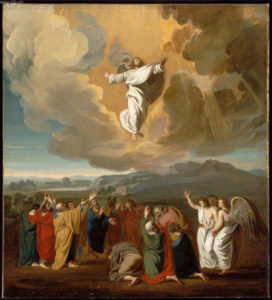
To start with, the term he uses, “The Son of Man”, rather than the “Son of God”. For the Son of Man is Christ of the Virgin Mary as we recite and affirm in the Creed. In the words of St. Augustin, “Therefore the Son of Man began to be here on earth where he took on himself flesh from the earth.”7 Basically, Jesus is Son of God from all eternity, but Son of Man, that happened in a point of history. The question that burned in the minds of the fathers is why he used the term Son of Man. We’ll pick up again from St. Augustin, “was the Son of Man in heaven before the time when he began to be on earth? Here he said, “Where he was before,” as if then he were not there when speaking these words. But in another place he said, “No man has ascended into heaven except he who has descended from heaven: The Son of Man who is in heaven.” He was speaking on earth and said he was in heaven. And he did not say it this way: No one has ascended into heaven except he who has descended from heaven; the Son of God who is in heaven.”8
Trinity
What does this mean and what are we to understand from it? It is this, Christ as God and man is one person and not two. Again from St. Augustin, “In this way our faith is only a Trinity and not a quaternity. Therefore Christ is one, the Word, soul and flesh, one Christ; the Son of God and the Son of Man, one Christ. The Son of God always, the Son of Man in time, nevertheless one Christ according to the unity of the person.”9 To recap the hard saying was an explanation of how to receive life through the sacraments. The harder saying and the one that ultimately caused the disciples to leave was the mystery of the Trinity and the mystery of the unity of the person of Christ.
It is the spirit that gives life, while the flesh is of no avail. The flesh by itself profits nothing. It is not a statement meaning that the flesh is evil because Christ would not have taken flesh in that case. Tertullian reminds us to look at the context. Jesus has just said that eating His flesh and drinking his blood gives life. Let spirit be added to flesh and it accomplishes much. In addition to the sacrament of the Eucharist, Tertullian exhorts us to devour him with the ear, and to ruminate on him with the mind i.e. to think over what he has said and digest him by faith.10
Responses to the Hard Teachings
If some will not accept the teachings of Christ, we must allow them to leave. For it is the part of true godliness not to compel but to persuade. However, that some will leave should not surprise for St. John himself speaks of this happening and the reason in his epistle. “They went out from us, but they were not of us. If they had been of us, they have of no doubt continued with us.” Some left in this passage this morning, but there leaving did not cause the rest of them to desert. Just because others leave, does not mean we are to as well. Jesus, however leaves the door open to the remaining disciples, “Will you also go away?”
Peter, on whom the church would be built, responds for the disciples and in fact for the church throughout history. His statement shows that although a rebellious and arrogant multitude may depart, yet the church does not depart from Christ. We see this being lived out by our brothers and sisters in ANiC, ACNA, GAFCON and FIFNA. It is a challenge for us as well to remain firm to Christ. In his confession of Jesus having the words of eternal life, he confessed and looked forward to the resurrection and all the benefits that would happen there.
Christ’s Protection
Christ does not leave us to fend for ourselves. Let us now turn our attention to the epistle reading for the encouragement of those who believe and are convinced that Jesus is the Holy One of God. The armour of God is one and the same with Christ. When we put on the armour, we put on Christ. The armour is put on in order that we can stand in the evil day. St. Jerome tells us that the evil day is the future temptations and trials we may face.11 They and now today we are being counselled to be prepared to stand in the faith of the gospel and not to lapse under persecution.
As we examine the armour, we see that the shield of faith is one of the foundational pieces. It is because of faith that St. Peter made the confession of belief. Unless we are armed with this shield we will not have the strength to battle courageously and resist all these deadly powers. Faith lives in righteousness. Faith remains the fountain of all virtues, as St. Paul has often stated. Righteousness is not as strong as faith because “righteousness lives by faith.” But the effect of righteousness is accomplished by faith.
Each time we partake of the Eucharist, we have the opportunity to partake of the flesh and blood of Christ. Each time we recite the creed, we affirm the Trinity of God and the humanity and deity of Christ. These hard sayings we accept and believe. Let us continue and live in the armour of God, being ready in faith and prayer for the trials and persecutions that will come our way. He has given us himself to keep us in the faith. Let us go forward in his protection.
~Dn. Fr. Matthew
1 Joel C. Elowsky and Thomas C. Oden Editors, Ancient Christian Commentary on Scripture New Testament IVa (Downers Grove, IL: InterVarsity Press, 2006), 241
2 Marco Conti and Thomas C. Oden Editors, Ancient Christian Commentary on Scripture Old Testament V (Downers Grove, IL: InterVarsity Press, 2008), 60-61
3 Marco Conti and Thomas C. Oden Editors, Ancient Christian Commentary on Scripture Old Testament V (Downers Grove, IL: InterVarsity Press, 2008), 60
4 Joel C. Elowsky and Thomas C. Oden Editors, Ancient Christian Commentary on Scripture New Testament IVa (Downers Grove, IL: InterVarsity Press, 2006), 242
5 Alexander Roberts, D.D., and James Donaldson, LL.D Editors, Ante-Nicene Fathers, Volume 5, Hippolytus, Cyprian, Caius, Novatian, Appendix, originally published in the United States by the Christian Literature Publishing Company, 1886 (Peabody, MA: Hendrickoson Publishing Marketing, LLC), 452
6 Philip Schaff, D.D., LL.D Editor, Nicene and Post-Nicene Fathers, First Series Volume 14, Chrysostom: Homilies on the Gospel of John, Hebrews, originally published in the United States by the Christian Literature Publishing Company, 1889 (Peabody, MA: Hendrickoson Publishing Marketing, LLC), 169
7 Joel C. Elowsky and Thomas C. Oden, Ancient Christian Commentary on Scripture New Testament IVa (Downers Grove, IL: InterVarsity Press, 2006), 245
8 ibid.
9 ibid.
10 Alexander Roberts, D.D., and James Donaldson, LL.D Editors, Ante-Nicene Fathers, Volume 3, Tertullian (I, II, III) originally published in the United States by the Christian Literature Publishing Company, 1885 (Peabody, MA: Hendrickoson Publishing Marketing, LLC), 572
11 Mark J. Edwards and Thomas C. Oden, Ancient Christian Commentary on Scripture New Testament VIII (Downers Grove, IL: InterVarsity Press, 1999), 198-199
Copley, John Singleton, 1738-1815. The Ascension, from Art in the Christian Tradition, a project of the Vanderbilt Divinity Library, Nashville, TN.http://diglib.library.vanderbilt.edu/act-imagelink.pl?RC=50177 [retrieved September 14, 2018]. Original source: http://www.mfa.org/.

